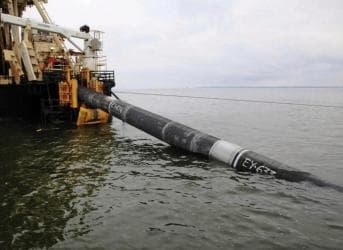Since the 1991 implosion of the USSR, the Russian Federation has been bedevilled by a transit problem – how to shift its natural gas exports to lucrative European markets without the pesky problem of transiting former Soviet republics Belarus and Ukraine. In contrast, Russian consumers pay heavily subsidized prices for Gazprom products, leaving European customers as the company’s cash cow.
Both energy-poor states have repeatedly interfered with Russian energy monopoly Gazprom’s export shipments, as Moscow and the former Soviet states battled over rising natural gas costs, with Gazprom’s lucrative energy exports held hostage.
Russia’s solution?
The 759 mile-long Nord Stream subsea offshore natural gas pipeline, from Vyborg in the Russian Federation’s Karelia to Greifswald in Germany has been laid along the bottom of the Baltic. Nord Stream is owned and operated by Nord Stream AG. Nord Stream’s first pipeline leg was laid in May 2011 and inaugurated on 8 November 2011, with a second parallel line to be laid in 2011–2012. After the commissioning of the second line at the end of 2012 the Nord Stream pipeline will be transporting 55 billion cubic meters of gas per year to Europe.
Now, Scandinavia and Britain are interested in Nord stream pipeline extensions.
The prospect makes Gazprom very happy, despite unease in Europe over the EU’s rising dependence on Russian natural gas. Speaking recently at the annual European Business Council meeting, Gazprom CEO Aleksei Miller alluded to the obstructionist policies of Belarus and Ukraine, telling his audience, "After the new gas pipelines are built, our exports will follow a more reliable delivery routes and, not unimportantly, provide additional flexibility. This will allow for significantly increasing the safe supply to European consumers of natural gas, which our company puts a lot of emphasis on. Once and for all there will be eliminated the unfounded approach of putting responsibility on Gazprom for the consequences of the decisions of others who block export deliveries of our gas."
On 23 May, Gazprom deputy chief executive officer Vitali Markelov announced that the first Nord Stream natural gas pipeline was performing at its maximum operating capacity, delivering natural gas at a rate of 971 billion cubic feet per year, telling reporters, "Yesterday, we reached the maximum capacity of Nord Stream."
And the future? On 14 May the Russian-led ownership consortium of Nord Stream AG, consisting of Gazprom, Germany's Wintershall Holding and E.ON Ruhrgas, the Dutch firm N.V. Nederlandse Gasunie and France's GDF Suez, issued a statement from its headquarters in Zug, Switzerland announcing a feasibility study for the potential construction of two additional pipelines.
After talks with German Chancellor Angela Merkel, Russian President Vladimir Putin said that Britain and the Scandinavian countries are showing interest in the supply of gas via Nord Stream as well. Putin told reporters, “Russia is interested in a strong European Union.” No doubt, as according to Putin, trade with the European Union accounts for roughly 50 percent of the Russian Federation’s trade, worth more than $350 billion annually.
And Nord Stream AG, the parent company of the pipeline? “The pipeline is a key factor in securing energy security in Europe.”
Oh, okay then.
The reality is that the European Union is as addicted to Russian energy imports as a crack addict is to cocaine. The original pipeline networks for exporting (then Soviet) natural gas to Europe date back to the 1970s, and then Brussels got a lot of pressure from the Reagan administration for its growing energy ties with the “Evil Empire,” especially as the EU provided support for the pipeline network in the form of advanced compressor stations. Forty years later, little has changed.
To Moscow’s credit, in the same period it has done everything possible not to kill the EU goose laying the golden euros, and it is notable that even after the 1991 implosion of the USSR, the natural gas deliveries continued like clockwork.
That said, Gazprom has experienced rising difficulties with transit states Belarus and Ukraine – hence Nord Stream, designed to cut Minsk and Kiev out of the loop.
So, whatever the unease in Brussels about growing EU energy dependence on the Russian Federation, the EU and the Russian Federation need each other, like an addict and his pusher.
Unless of course, the EU decides to spend a lot of euros and cut its energy umbilical cord to Russia by embracing renewable energy.
Don’t hold your breath.
By. John C.K. Daly of Oilprice.com



















Nord stream is simply confirming Russia's approaching stranglehold on Europe via energy supply. Ever since the mid 1970's when Socialist and pro-Moscow German Chancellor Willi 'Ostpolitik' Brandt tied the then West Germany to the thn Soviet energy supply, Europe has been gradually but irreversibly drawn towards the 'lion's mouth' or perhaps that shoild be the (Russian) bear's embrace.
There is an almost geophysical/political inevitability, at least ever since 1917 about this.
So many Socialist, Communists and fellow travellers in Europe seemed to be blindly addicted to following the Moscow line that Putin's Eurasian Union is only the latest version of 'Euro-Russia' from Portugal to Vladivostok.
And energy supply is at its heart. Comrade Merkel formerly of DDR Agitprop (did she know Putin of the Dresden KGB in her Comsomol Youth? Did they even plan her rise to power in (West) Germany?) dovetails very nicely with Comrsde Putin on this. German plans for hegemony over Europe (website; German-Foreign-Policy) also dovetail with Putin's Eurasian project.
Even in WW2, Germany largely failed because by invading the SU it lost its main supply of oil (Caspioan) and other precious metals and resourcves coming either from the SU or through the SU from the Far East.
So, as you say, John Daly, don't hold your breath...